
In this first episode of the Single Sitting series on the podcast, Marc and I discuss Harlan Ellison’s great story “Jeffty is Five”.
Download or listen via this link: |Single Sitting #1: Jeffty is Five|
YouTube: |Link|

In this first episode of the Single Sitting series on the podcast, Marc and I discuss Harlan Ellison’s great story “Jeffty is Five”.
Download or listen via this link: |Single Sitting #1: Jeffty is Five|
YouTube: |Link|
In this episode of the Shelf Wear podcast, I’m joined by my good friend Jesse Willis of The SFFaudio Podcast and the Reading, Short and Deep podcast. We discuss Donald Westlake’s novel Somebody Owes Me Money and talk about many other things Westlake.
— Donald Westlake’s first story was “Or Give Me Death” in Universe Science Fiction magazine
— “The Risk Profession” is another science fiction story by Westlake, about insurance
Other Westlake books mentioned:
Download or listen via this link: |Shelf Wear Book #1: Somebody Owes Me Money| or on |YouTube|.
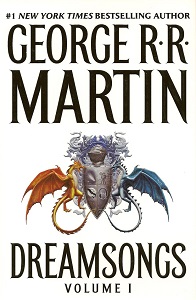
George R. R. Martin wrote some excellent science fiction stories back in the late 70’s and early 80’s. “Sandkings” is one of the most popular of those. It won the Hugo, the Nebula, and the Locus Award for Best Novelette.
The story is collected in Dreamsongs, Volume 1, which contains a bunch of Martin’s most popular stories. Both volumes of Dreamsongs serve as a retrospective on the author’s career, from fan through science fiction/fantasy author to his successful stints of TV work.
Dreamsongs is also available on audio, where nearly all of the stories are presented in 51 hours of audio. “Sandkings” is read by Mark Bramhall in that collection.
I so thoroughly enjoyed A Game of Thrones, the first volume of George R.R. Martin’s epic fantasy series, that I eagerly read “Sandkings” the first time I came across it. I found the novelette to have the same clear, readable prose style as his novel. It also showcased Martin’s ability to build suspense. Another time through (my third?), I still think it’s excellent.
In the story, a man named Simon Kress lives on a planet somewhere (I’m fairly certain it’s not Earth, but I don’t recall it ever being specifically stated). He’s a rich man that is fond of exotic pets. He’s also a powerful man that is fond of his power. On a shopping trip to replace some of his pets that died after being neglected during an extended business trip, he purchases some sandkings – intelligent ant creatures that work with a collective hive mind. He puts them in a large terrarium, and he observes with delight as the creatures war with each other over resources.
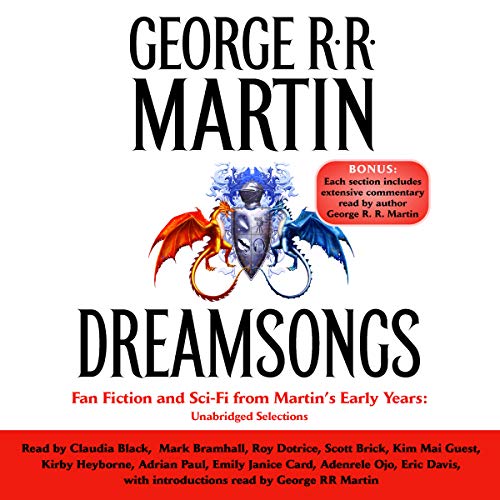
Even more fascinating? The sandkings worship. Kress projects a hologram of his own face over the terrarium, and the creatures build shrines to him, etching his likeness on their small castles. When Kress gets bored, he shakes things up a bit by not feeding them. He manipulates them into fighting in every way he can think of. And things go badly.
The story is as much a commentary on the dangers of playing God (or the need some people have to do so) as it is a horror story about uncontrollable dangerous creatures. In fact, it completely succeeds at being both of those things, which is why I enjoy re-reading it so much. It’s a rich story that leaves me both unsettled and contemplative.
“Sandkings” was an episode of The Outer Limits in 1995. More info on that can be found at Wikipedia.
This book has four stories in it:
“Induction” (1957) – a one-page story, and the first.
“The Snow Women” (1970) – about an 18 year-old Conan-esque Fafhrd, who lives in the wild and cold north but longs for civilization
“The Unholy Grail” (1963) – about a similarly aged Gray Mouser, who has been trained by a wizard who gives him that name.
“Ill Met in Lankhmar” (1970) – the story of the meeting of the two, in a city called Lankhmar.
There are lots of editions of this book out there. I was lucky to read it in a beautiful illustrated Centipede Press edition. The book is available on audio at Audible, read by Jonathan Davis, who is one of the best narrators out there. The audiobook as a whole there is $16, but as of this writing, you can buy “The Snow Women”, “The Unholy Grail”, and “Ill Met in Lankhmar” individually for $1.99 each.
I had read “Ill Met in Lankhmar” before, and felt lukewarm about it. “The Snow Women” was recommended to me, so I read that and was captured by it, just loved it. So I kept reading all the way through. Turns out that the stories before “Ill Met” provide a context that I didn’t know I was missing. I thoroughly enjoyed re-reading “Ill Met in Lankhmar” too.
The stories are in the Sword and Sorcery subgenre. Leiber may have coined that term. I’m learning some about the subgenre from Brian Murphy’s Flame and Crimson: A History of Sword and Sorcery. Murphy wrote a good section in that book which discusses Leiber’s influences and gives an overview of the whole series. He also shows the place the series holds in the history of the genre.
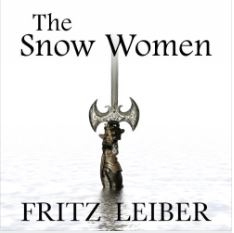
“The Snow Women” recalled Gilgamesh to me. Gilgamesh was from civilization, his friend Enkidu was wild. Fafhrd, 18 years old, is a kid very comfortable in the wild. He climbs a tree to get to the place where he stashes his stuff. He runs on the snow without difficulty. Yet he longs for civilization. Is this frozen tundra all there is? This strong feeling makes him fall for Vlana, a person he sees as civilized, despite his pregnant girlfriend. Ironic that in the pursuit of civilization, he rejects the civilized choice to stay with his family.
The Gray Mouser is introduced in “The Unholy Grail”. We meet him having already been trained as a wizard by Glavas Rho. He was called a mouse because of his stature, and gray because he didn’t embrace the light or the dark, but used each as needed. He changed “mouse” to “mouser” because due to events in this story, he no longer wanted to be the hunted – he became the hunter. There’s an extraordinary scene in this story of the Gray Mouser captured and on the torture rack.
And then “Ill Met in Lankhmar”. This tells the story of the two men’s first meeting. They individually attack a pair of thieves at the same moment, then, recognizing something deep inside the other, decide to split the loot “sixty-sixty” rather than fight it out between them. Again this brings the deep friendship of Gilgamesh and Enkidu to my mind. Then comes excessive drink, some questionable decision making, and tragedy.
There are seven books in this Sword and Sorcery series. I haven’t read any of the others yet. It appears that these stories, written in 1963 and 1970, are a prequel. Fafhrd and the Gray Mouser have stories that were written from 1939 through the early 1980’s.
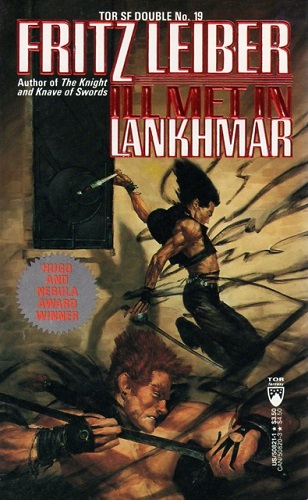
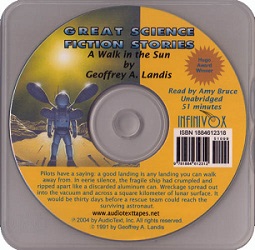 Written long before Andy Weir’s The Martian, “A Walk in the Sun” by Geoffrey A. Landis gives us a science fiction survival story a bit closer to home. Trish Mulligan is the last one alive on the moon after crash landing a ship that was never meant to land at all. Luckily, her solar powered spacesuit is operational. Unluckily, a rescue is thirty days away. To survive, she’s got to keep her suit working, and to keep her suit working? She’s got to keep it in the sun.
Written long before Andy Weir’s The Martian, “A Walk in the Sun” by Geoffrey A. Landis gives us a science fiction survival story a bit closer to home. Trish Mulligan is the last one alive on the moon after crash landing a ship that was never meant to land at all. Luckily, her solar powered spacesuit is operational. Unluckily, a rescue is thirty days away. To survive, she’s got to keep her suit working, and to keep her suit working? She’s got to keep it in the sun.
I like a science fiction story that lets me involve my calculator. (And yes, I mean “calculator”. My trusty old HP-15C… still love that thing.)
The diameter of the moon = 6786 miles.
The moon rotates once every 27 days.
So to keep that suit in the sun, Trish needs to average 10.47 miles per hour for 27 days. And she’s only got her legs to move her.
Can she keep that pace in the low gravity of the moon?
I listened to Infinivox’s recording of the story, read by Amy Bruce. She’s quite good and a great match with the story. It runs 51 minutes and you can get it on Audible for $5. I’ve listened to this a few times over the years so yeah, I enjoy it very much.
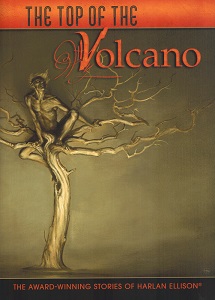 One of my most treasured books is my The Top of the Volcano hardcover, a complete (at the time of publication, 2014) collection of Harlan Ellison’s award-winning stories published by Subterranean Press. It’s a beautiful book and the content… well this is arguably Harlan Ellison’s very best stuff. It will blow your socks off.
One of my most treasured books is my The Top of the Volcano hardcover, a complete (at the time of publication, 2014) collection of Harlan Ellison’s award-winning stories published by Subterranean Press. It’s a beautiful book and the content… well this is arguably Harlan Ellison’s very best stuff. It will blow your socks off.
I recently re-read “‘Repent, Harlequin!’ Said the Ticktockman”, which is the first story in this collection. It’s one of my favorite Ellison stories because it hits me right where I live. It has inspired me a time or several to stop and wonder what it is exactly that I’m doing in my life. I’m still not a jelly bean tosser, but at the very least I’m galvanized to suppress my inner Ticktockman.
 As beautiful a book at The Top of the Volcano is, there are two audio versions of this story that ought not be missed. The first is Harlan Ellison’s reading of the story that is part of The Voice from the Edge: I Have No Mouth and I Must Scream. Ellison is a fine forward-leaning narrator that demands attention. You can find this audiobook at Downpour and Audible.
As beautiful a book at The Top of the Volcano is, there are two audio versions of this story that ought not be missed. The first is Harlan Ellison’s reading of the story that is part of The Voice from the Edge: I Have No Mouth and I Must Scream. Ellison is a fine forward-leaning narrator that demands attention. You can find this audiobook at Downpour and Audible.
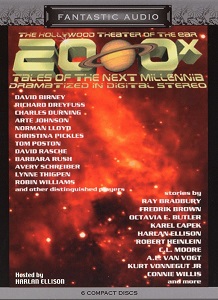 This story was dramatized as part of the 2000X: Tales of the New Millennia radio series, which is worth tracking down. It stars Robin Williams as the Harlequin (Everett C. Marm), Stefan Rudnicki as the Ticktockman, and Harlan Ellison as the narrator (and host of the entire series). Yuri Rasovsky was producer/director. It looks like it’s out of print, so a used copy is your best bet. Another gem in that series is Richard Dreyfuss starring in Robert A. Heinlein’s “By His Bootstraps”. Listen through good headphones!
This story was dramatized as part of the 2000X: Tales of the New Millennia radio series, which is worth tracking down. It stars Robin Williams as the Harlequin (Everett C. Marm), Stefan Rudnicki as the Ticktockman, and Harlan Ellison as the narrator (and host of the entire series). Yuri Rasovsky was producer/director. It looks like it’s out of print, so a used copy is your best bet. Another gem in that series is Richard Dreyfuss starring in Robert A. Heinlein’s “By His Bootstraps”. Listen through good headphones!
A few miles from here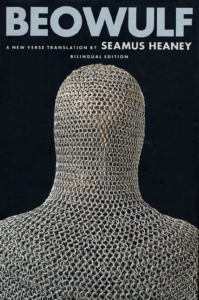
a frost-stiffened wood waits and keeps watch
above a mere; the overhanging bank
is a maze of tree-roots mirrored in its surface.
At night there, something uncanny happens:
the water burns. And the mere bottom
has never been sounded by the sons of men.
On its bank, the heather-stepper halts:
the hart in flight from pursuing hounds
will turn to face them with firm-set horns
and die in the wood rather than dive
beneath its surface. That is no good place.
— Beowulf, 1361-1372, as translated by Seamus Heaney
I re-read “The Cartographer Wasps and the Anarchist Bees” by E. Lily Yu yesterday. Find it here, at Clarkesworld.
What a wonderful story that is. It brings “Animal Farm” by George Orwell to mind for obvious reasons – anthropomorphic animals doing political things. “Animal Farm”, however, had a connection to actual political figures, and that got me wondering if E. Lily Yu was saying something as specific as Orwell in her story.
I poked around and found an interview with her, where she was asked about the story. She talked about entomology and a course she took on postcolonialism… and then she said this beautiful thing:
These are guesses. I’m waffling. There are some stories that come to you by grace, or by a neutrino hitting your brain, whose origins are unfathomable. This was one of them.
Wonderful.
Before I read that, I felt that the story was about political realities that come about as a result of violence and fear. The story still is about that, but now there is the beauty of grace and a neutrino.
The opening paragraph of The Guns of August by Barbara Tuchman:
So gorgeous was the spectacle on the May morning of 1910 when nine kings rode in the funeral of Edward VII of England that the crowd, waiting in hushed and black-clad awe, could not keep back gasps of admiration. In scarlet and blue and green and purple, three by three the sovereigns rode through the palace gates, with plumed helmets, gold braid, crimson sashes, and jeweled orders flashing in the sun. After them came five heirs apparent, forty more imperial or royal highnesses, seven queens — four dowager and three regnant — and a scattering of special ambassadors from uncrowned countries. Together they represented seventy nations in the greatest assemblage of royalty and rank ever gathered in one place and, of its kind, the last. The muffled tongue of Big Ben tolled nine by the clock as the cortege left the palace, but on history’s clock it was sunset, and the sun of the old world was setting in a dying blaze of splendor never to be seen again.
 I re-read some of this book (published in 2010) this weekend, and am reminded of the perspective of President Bush during the time following 9/11. He describes being given the badge of someone who died when the towers fell, and then:
I re-read some of this book (published in 2010) this weekend, and am reminded of the perspective of President Bush during the time following 9/11. He describes being given the badge of someone who died when the towers fell, and then:
I served 2685 days as President after Arlene gave me that badge. I kept it with me every one of them. As the years passed, most Americans returned to life as usual. That was natural and desirable. It meant the country was healing and felt safer.
As I record these thoughts, that day of fire is a distant memory for some of our citizens. The youngest Americans have no firsthand knowledge of that day. Eventually, Sept. 11 will come to feel more like Pearl Harbor Day; an honored date on the calendar and an important moment in history. But not a scar on the heart. Not a reason to fight on.
For me, the week of Sept. 11 will always be something more. I still see the Pentagon smoldering, the towers in flames. And that pile of twisted steel.
I still hear the voices of the loved ones searching for survivors and the workers yelling “Do not let me down!” and “Whatever it takes!” I still feel the sadness of the children, the agony of the burn victims, and the torment of the broken families. I still marvel at the bravery of the firefighters and the compassion of strangers. And the matchless courage of the passengers who forced down that plane.
September 11 redefined sacrifice. It redefined duty. And it redefined my job. The story of that week is the key to understanding my presidency. There were so many decisions that followed, many of them controversial and complex, yet after 9/11 I felt my responsibility was clear. For as long as I held office, I could never forget what happened to America that day. I would pour my heart and soul into protecting the country, whatever it took.
That is from the end of Chapter 5.
Bush talks in detail about many of those decisions that were made.
Also very interesting to me was this in Chapter 6: “Between 9/11 and mid-2003, the CIA reported to me on average of 400 specific threats each month.”
My original review of this book from November 2010:
I haven’t rated much non-fiction on Goodreads, but since I intend to read a whole lot more of it, I should develop some kind of criteria. Still – to slap a star rating on what amounts to an important historical document seems wrong. I see that many people are attaching ratings that correspond with how much they like or dislike the man, and I think that’s wrong too.
What President Bush has done here is present his life (mostly his life as the President of the United States) as a series of crises that required a decision. Each chapter focuses on a specific moment or event, and the chapters could be read individually without the benefit of the rest of the book. So, if you are interested in 9/11 and the days after, pick it up and read Chapter 5 (Day of Fire). Other chapters include “Katrina”, “Surge”, and “War Footing”.
The book is written in a conversational manner that remains compelling if you are interested in what he’s talking about. I appreciated the personal details about those around him, like a note passed to the President from Secretary of State Colin Powell about how not to choke up during an emotional speech. I also enjoyed the insider view of how things work when you are the President.
It’s a book that delivers exactly what it promises, and it’s well written.
 This is not so much a review of my friend Julie’s book, but an appreciation, for her book is exactly my kind of thing, and appreciate it I do.
This is not so much a review of my friend Julie’s book, but an appreciation, for her book is exactly my kind of thing, and appreciate it I do.
As I re-embraced Catholicism years ago, there were stumbling blocks. One of those stumbling blocks was that the world of science fiction, which I loved, generally was not on Catholicism’s side. I would sometimes despair to a point where I was convinced that I needed to give up one or the other – Catholicism or science fiction. I was exhausted by the tension between what I knew and the constant challenge of speculation.
As time progressed, I realized a couple of things. First, there is nothing wrong with reading fiction that challenges your ideas. Over time, those challenges reinforced my beliefs because they made me confront things that needed looking into.
Second, there is a heck of lot going on in science fiction (and literature in general) that presents universal truths that we all share as human beings. That’s exactly what Julie proves in this wonderful book. She shares quotes from all kinds of sources – Batman to St. Pio, House M.D. to Albert Einstein. In those quotes she finds the thoughts on which she reflects.
If I had this book back when I was feeling conflicted, I’d have realized that I was not alone. When Robin says to Batman, “Self control is sure tough, Batman,” I would have known that I’m not the only one that thought “Isn’t that interesting… my priest said that in a homily last week. It’s not supposed to be easy.”
And even though I’m not conflicted now, I find this book a treasure because it’s enlightening, thoughtful, honest, and fun. Happy Catholic reminds me that God is everywhere. All I have to do is listen.
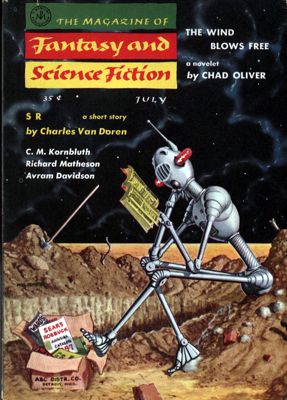 Julie and I talked about the movie Quiz Show in our last Good Story podcast, and I brought up how Charles van Doren was connected to Thomas Merton and Mortimer Adler. What I did not know was that Charles van Doren published a science fiction short story in The Magazine of Fantasy and Science Fiction.
Julie and I talked about the movie Quiz Show in our last Good Story podcast, and I brought up how Charles van Doren was connected to Thomas Merton and Mortimer Adler. What I did not know was that Charles van Doren published a science fiction short story in The Magazine of Fantasy and Science Fiction.
The story is called “S R”, and is about a man whose palm has been tattooed with the letters S and R as part of the punishment for a crime that is never explained. The man tries and fails to rejoin society, because folks shun people with this tattoo by doing things like refusing to hire them. The man reaches a breaking point and takes desperate measures to remove the mark from his body, only to find that in the hospital the authorities just mark him again in a different location. It’s a good story with a 1984 feel to it.
The story was published in the July 1957 issue. His run on the quiz show “21” ended on March 11, 1957, and his testimony before Congress took place in 1959.
According to ISFDB, this was van Doren’s only published science fiction story, and that story’s only appearance is in this issue of FSF.
Thanks for the find, Jesse!